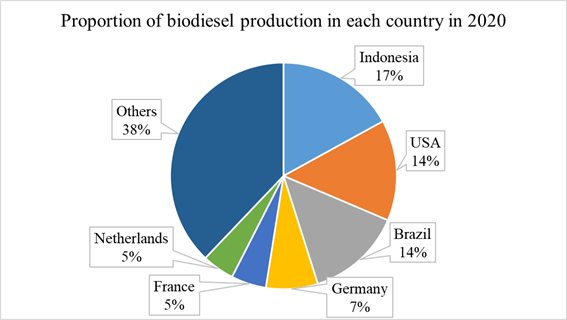Analysis on the Development Status of Biodiesel Industry
With the increasing global demand for renewable energy, biodiesel, as a kind of green energy, is gradually attracting attention from all countries.
At present, the mainstream process of kitchen waste treatment mostly adopts "pretreatment & anaerobic fermentation" to produce biogas. In the pretreatment process, kitchen waste is heated and separated into three phases to produce "oil, water and residue". Among them, the generated crude oil, as an important profit point of the kitchen waste treatment project, will be used as industrial raw materials, and can be made into biodiesel to enter the next link for profit. In recent years, more and more kitchen waste treatment enterprises are paying attention to the oil extraction rate of kitchen waste treatment and the ways to recycle waste oil.
With the increasing global demand for renewable energy, biodiesel, as an environmental protection and green energy, is gradually attracting attention and attention from all countries. This paper analyzes the domestic and international market situation, production technology and policy changes of biodiesel industry, and discusses its future development trend and challenges. Biodiesel is a liquid fuel with similar composition to petroleum diesel, which is synthesized from renewable resources such as vegetable oil and animal fat, and decomposed with glyceride. It has the characteristics of high cetane number and low sulfur, and is generally used after being mixed with traditional petrochemical diesel oil in a certain proportion, which has obvious effect on improving the emission of hydrocarbons, carbon monoxide and black smoke in the tail gas of traditional diesel vehicles.
In 2022, global biodiesel consumption was about 41.75 million tons, up 3.7% year-on-year. Among them, EU consumption accounts for 34.7%, making it the largest biodiesel market in the world. In recent years, the European Union has made a resolution to greatly increase the energy share of renewable energy in the transportation sector to 29% in 2030, while the proportion in 2020 is only 10.2%. In the process of achieving this goal, the EU will actively promote the increase of biodiesel consumption and promote the transformation of its raw material structure to non-grain raw materials such as waste edible oil (UCO).
Indonesia is the world's largest producer of biodiesel, accounting for about 17% of its output. Since 2006, Indonesia has issued a biofuel policy at the national level, which involves regulations on the procurement and use of biofuels. In recent years, in order to promote the development of related industries, the Indonesian government has continuously introduced relevant policies to increase the proportion of biodiesel. By 2019, Indonesia has increased the proportion of biodiesel added in the transportation sector to 30%, and given a lot of subsidies, making it one of the countries with the highest proportion of biodiesel added in the world. In 2022, Indonesia maintained the goal of 30% biodiesel blending ratio, and began to enforce the B35 biodiesel plan on February 1, 2023. B35 is a plant fuel based on palm oil, that is, a mixture of fatty acid methyl ester and diesel oil. The palm oil content in the mixture is as high as 35%, while the other 65% is diesel oil.

The production and sales of biodiesel have increased rapidly in recent years, with the countries in the world further increasing the compulsory consumption of biodiesel, especially under the influence of various policies supporting advanced biofuels with lower carbon and more sustainability. Some traditional oil processing enterprises in Europe and America have also begun to intentionally expand the production of advanced biofuels. At present, many oil companies in Europe and America have started to produce biofuels. In addition, Shell, Total, Eni, Marathon and other oil companies have plans to start producing advanced biofuels such as biodiesel (using oil hydrogenation process to produce biodiesel) and aviation biofuels.
